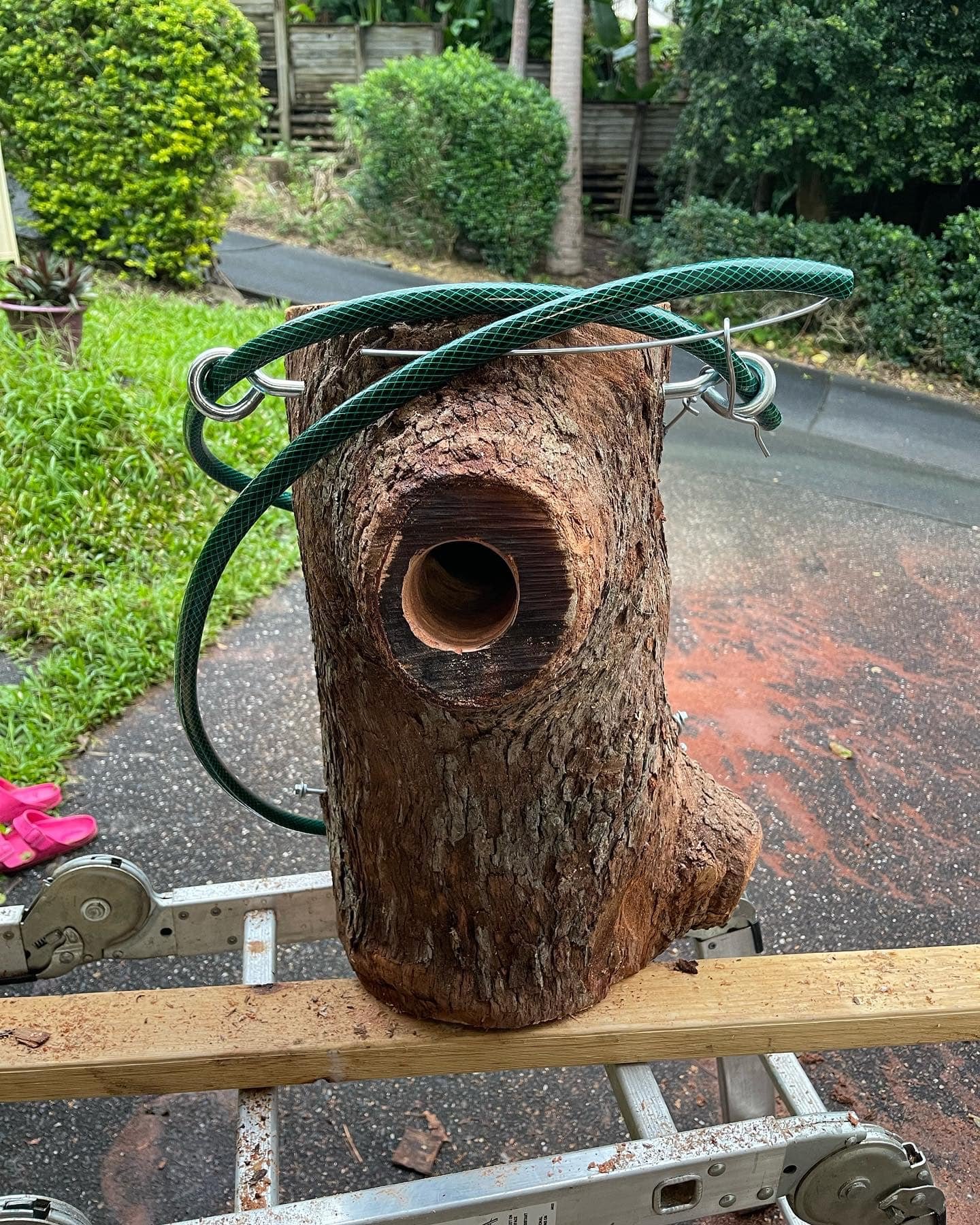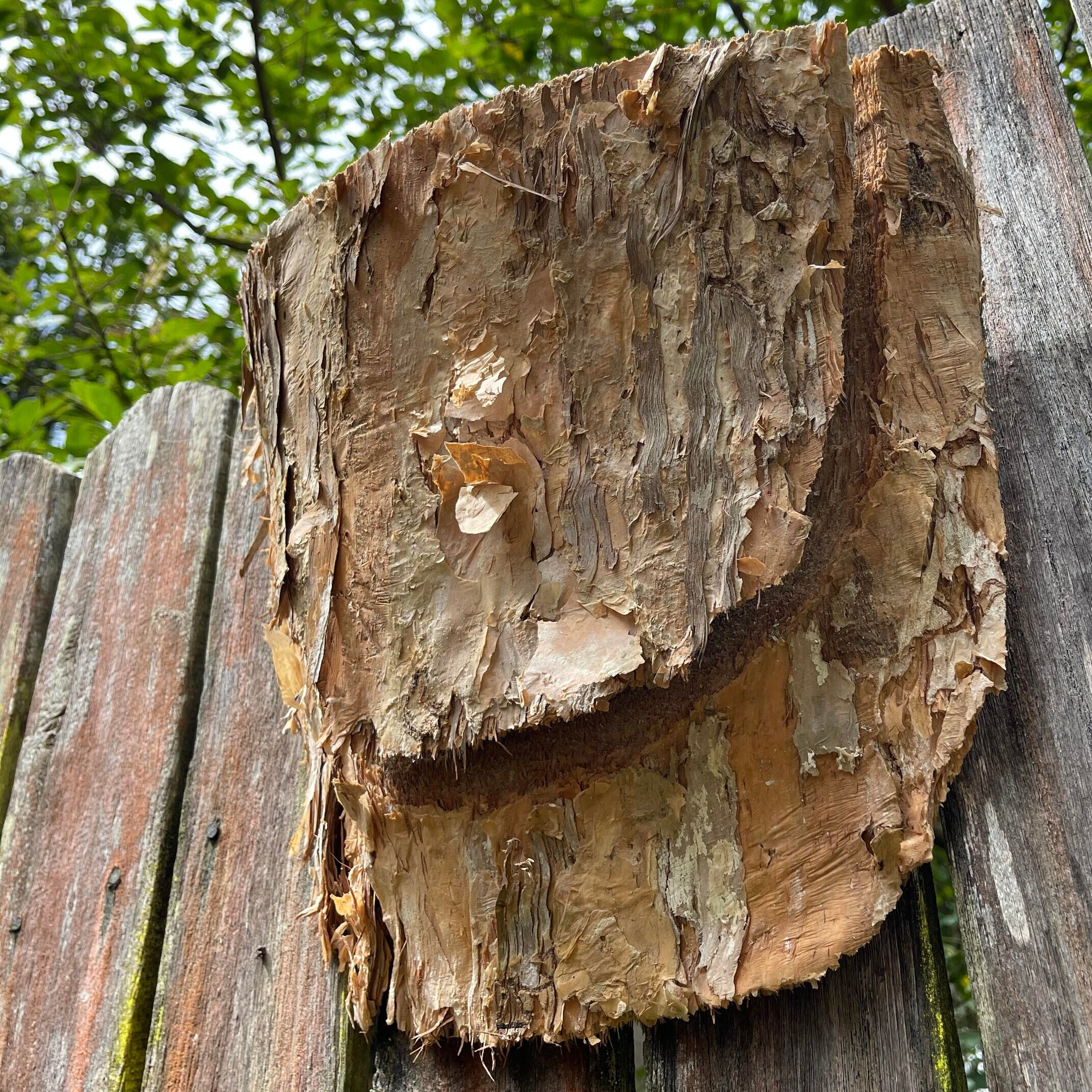Nest boxes
More than 300 species - approximately 15% - of native Australian bird, mammal, reptile, and amphibian species are reliant upon tree hollows. In NSW alone, there are more than 150 hollow-dependent species, of which 40 are listed as threatened.
Given that it can take decades or even centuries for tree hollows to form, but only a day for them to be removed, we are losing tree hollows at a far greater rate than new ones can develop. It is now at the point where the loss of hollow-bearing trees is recognised by the NSW Government as a ‘key threatening process’ to biodiversity. Herein lies the need for nest boxes.
Traditionally, nest boxes have been constructed from untreated plywood, which tends to require regular maintenance and replacement, and research has shown that they can be ineffective. More recently, people have been making nest boxes out of hollow logs, but given that the removal of dead wood and dead trees is also recognised as a key threatening process to biodiversity in NSW, hollow logs are far better off left in the bush.
Treehouse Arboriculture specialises in ‘chainsaw hollows’ - nest boxes which are carved out of a solid hardwood log. Research has shown that chainsaw hollows better replicate the thermal properties of natural hollows than plywood or hollow log nest boxes, and that they can be occupied within days.
Treehouse Arboriculture has extensive experience with customised, species-specific chainsaw hollow installation, having created more than 150 ‘habitat stags’ including more than 450 chainsaw hollows, and having written articles on the subject for the International Society of Arboriculture, and Sustainable Gardening Australia.
Treehouse Arboriculture can supply species-specific artificial hollows customised for any of the species listed below. Treehouse Arboriculture can also provide other specialised recommendations for creating or enhancing habitat features for native wildlife on your property. Click here for more details, or here to get in touch.
Hollow-dependent species of the Coffs Coast
The below species all inhabit the Coffs Coast*, and all depend on tree hollows at some point in their life cycle. Treehouse Arboriculture can supply species-specific chainsaw hollows and installation specifications customised for any of the below species.
*Based on a search of the NSW Wildlife Atlas for the Coffs Harbour LGA since January 1st, 2010.
• Australian King Parrot • Australian Wood Duck • Barking Owl • Barred-sided Skink • Bearded Dragon • Bleating Tree Frog • Brown Antechinus • Brown Falcon • Brown Tree Snake • Brown Treecreeper • Brush-tailed Phascogale • Buff-rumped Thornbill • Chestnut Teal • Chocolate Wattled Bat • Common Brushtail Possum • Common Ringtail Possum • Common Tree Snake • Crimson Rosella • Dainty Green Tree Frog • Diamond Python • Dollarbird • Dusky Antechinus • Eastern Barn Owl • Eastern Broad-nosed Bat • Eastern Carpet Python • Eastern Coastal Free-tailed Bat • Eastern Crevice Skink • Eastern Dwarf Tree Frog • Eastern Forest Bat • Eastern Free-tailed Bat • Eastern Grass Owl • Eastern Pygmy-possum •
• Eastern Long-eared Bat • Eastern Rosella • Feathertail Glider • Forest Kingfisher • Galah • Glossy Black Cockatoo • Golden-crowned Snake • Golden-tipped Bat • Gould’s Goanna • Gould’s Long-eared Bat • Gould’s Wattled Bat • Greater Broad-nosed Bat • Glider • Green Tree Frog • Grey Strike-thrush • Grey Teal • Hoary Wattled Bat • Lace Monitor • Large Bent-winged Bat • Large Forest Bat • Laughing Kookaburra • Leaf-green Tree Frog • Lesser Long-eared Bat • Little Bent-winged Bat • Little Corella • Little Forest Bat • Little Lorikeet • Masked Owl • Masked Woodswallow • Musk Lorikeet • Nankeen Kestrel • Pacific Black Duck • Pale-headed Snake • Peregrine Falcon • Peron’s Tree Frog •
• Powerful Owl • Rainbow Lorikeet • Red-browed Treecreeper • Red-eyed Tree Frog • Robust Velvet Gecko • Rough-scaled Snake • Sacred Kingfisher • Scaly-breasted Lorikeet • Scarlet Robin • Short-eared Possum • Sooty Owl • Southern Angle-headed Dragon • Southern Boobook • Southern Forest Bat • Southern Leaf-tailed Gecko • Southern Myotis • Spotted Pardalote • Spotted-tailed Quoll • Stephens’ Banded Snake • Squirrel Glider • Striated Pardalote • Sugar Glider • Sulphur-crested Cockatoo • Tree Martin • Tyler’s Tree Frog • White-breasted Woodswallow • White-striped Free-tailed Bat • White-throated Treecreeper • Yellow-bellied Glider • Yellow-footed Antechinus • Yellow-tailed Black Cockatoo •
Chainsaw hollows
Treehouse Arboriculture can supply species-specific chainsaw hollows and installation specifications customised for any of the bird, possum, glider, dasyurid, reptile, and amphibian species listed above.
All chainsaw hollows come supplied with species-specific installation specifications, and all hardware required for installation.
Microbat flats
Treehouse Arboriculture can supply species-specific ‘bat flats’ customised for any of the microbat species listed above.
All bat flats come supplied with species-specific installation specifications, and all hardware required for installation.
Bee hives
Treehouse Arboriculture can supply chainsaw hollows and installation specifications customised for Australia’s native stingless bee species, Tetragonula spp. and Austroplebeia spp..
All chainsaw hollows come supplied with species-specific installation specifications, and all hardware required for installation.



